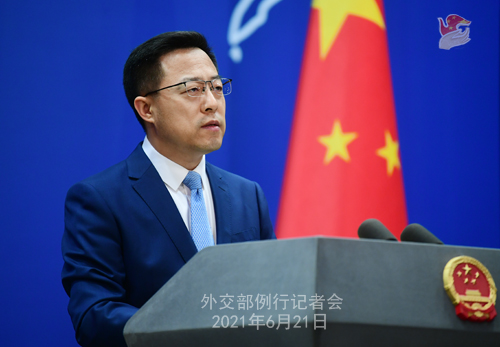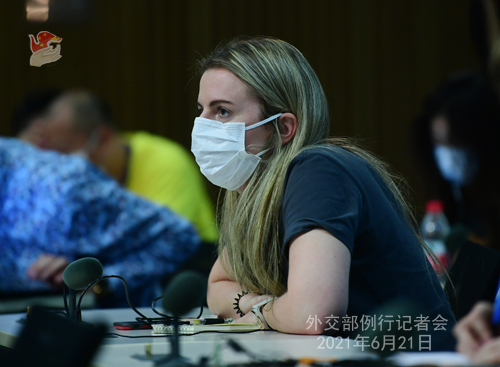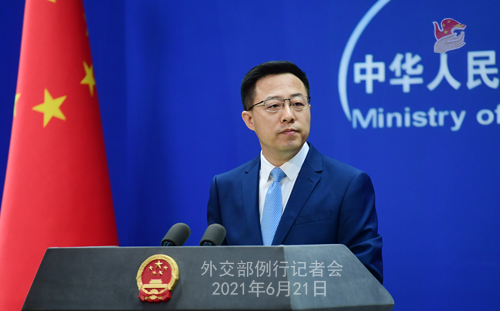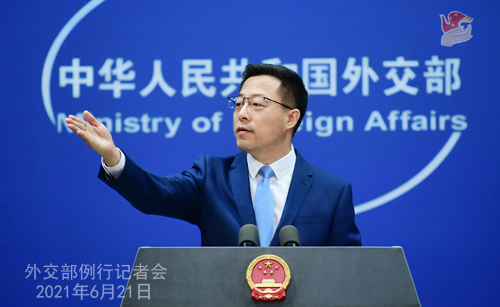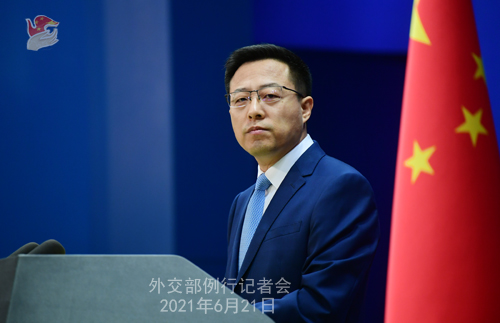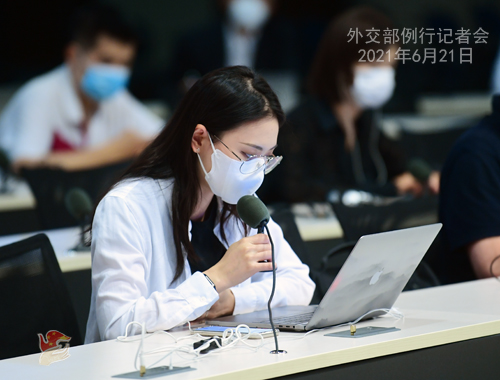| Foreign Ministry Spokesperson Zhao Lijian's Regular Press Conference on June 21, 2021 |
| 2021-06-21 20:12 |
|
CCTV:As we understand, senior officials' meetings on East Asia cooperation will be held in coming days. What expectations does China have for these upcoming meetings? Zhao Lijian: The Association of Southeast Asian Nations (ASEAN) Plus Three (China, Japan and the Republic of Korea) Senior Officials' Meeting (APT SOM), East Asia Summit Senior Officials' Meeting (EAS SOM) and ASEAN Regional Forum Senior Officials' Meeting (ARF SOM) will be held in video format on June 22, 24 and 29 respectively. During the meetings, participants will hold discussions on progress and future direction of relevant cooperation mechanisms, exchange views on regional and international issues of mutual interest and prepare for the Foreign Ministers' Meeting and Leaders' Meeting on East Asia Cooperation to be held in the second half of this year. Assistant Foreign Minister Wu Jianghao will attend the above-mentioned meetings. Since the beginning of this year, in the face of rampant COVID-19, East Asian countries have taken active steps to deepen anti-epidemic cooperation, boosted economic recovery, continued to expand practical cooperation in such areas as digital economy and green development, which effectively maintained the momentum for steady development in the region. Not long ago, the Special ASEAN-China Foreign Ministers' Meeting in Celebration of the 30th Anniversary of Dialogue Relations was successfully held, where important consensus was reached on upgrading and elevating bilateral relations, enhancing anti-epidemic and development cooperation and promoting regional economic integration. Amid profound changes in regional and international landscapes, China hopes that through these senior officials' meetings, we will work with all parties to expand consensus, deepen cooperation, improve regional governance, jointly improve public health, advance post-epidemic sustainable development and uphold regional peace, stability and prosperity. Reuters: The US shipped 2.5 million doses of coronavirus vaccine to Taiwan yesterday. Do you see this as a provocative move? Do you have any comments on this? Zhao Lijian: The mainland and Taiwan are one family. Our hearts are with our Taiwan compatriots who are faced with the grave situation. We have always made clear the readiness to do our utmost to help our compatriots in Taiwan overcome the difficulties at an early date. However, despite the goodwill of the mainland and the eagerness of the majority of Taiwan compatriots to use vaccines from the mainland, the DPP authorities tried every means to obstruct the shipping of vaccines from the mainland to Taiwan, and even falsely claimed that the mainland was obstructing its vaccine procurement. For their own selfish political gains, the DPP authorities constantly seek political manipulation over anti-epidemic cooperation, showing disregard of the lives and health of Taiwan compatriots and violating the basic humanitarian spirit. China always supports anti-epidemic cooperation and has made proactive efforts to this end. We urge the US side not to use vaccine aid for political maneuver or interference in China's internal affairs.
Bloomberg: A question regarding a statement by the US National Security Advisor Jake Sullivan who says that China will risk international isolation if it fails to allow a real investigation on its territory into the origins of the virus that caused COVID-19. What's the foreign ministry's comment on Mr. Sullivan position? Zhao Lijian: China deplores and rejects the relevant remarks by the US side which is sheer blackmail and threat. Since the outbreak of the epidemic, China has unreservedly shared with other countries its experience in containment and treatment in an open and transparent manner. China has received WHO experts twice and co-released with WHO the joint mission report on origin-tracing, making positive contributions to the global efforts in this regard. There is no ground to accuse China of saying "no" to origin-tracing study. It is inflammatory and sensational statement that China is facing isolation in the international community. Origin-tracing is a scientific matter that requires international cooperation of scientists across the globe. The vast majority of countries in the international community agree that this issue should not to be wantonly politicized. On the contrary, it is the US side, by obstinately pressing ahead with the so-called "international investigation" through political manipulation, using intelligence service to replace scientists for evaluation, and clamoring for the "position of strength" on the issue of origin-tracing, that stands on the opposite side of the overwhelming majority in the international community, and thus is facing isolation in the international community. The US has been attacking China time and again for no other purpose than to hold back China's development, and shift the blame for its poor epidemic response. If the US does care about the truth, it needs to answer the following three questions with no delay: First, who on earth should be held accountable for the US failure to fight the epidemic? To date, the number of infections and deaths in the US has exceeded 33.54 million and 600,000 respectively. As a country equipped with the world's most advanced medical resource and technology, the US needs to hold relevant US officials accountable for the botched response, take measures to prevent a repetition of such tragedies so that American people who lost their lives didn't die for nothing. Second, does local transmission of the novel coronavirus in the US date back earlier? The National Institutes of Health (NIH) of the US recently published a new study which analyzed more than 24,000 stored blood samples contributed by participants during the first three months of 2020, and concluded that SARS-CoV-2, the virus that causes COVID-19, was present in the US as far back as December 2019, weeks before the first officially reported cases. A report by the US Centers for Disease Control and Prevention (CDC) and the Infectious Diseases Society of America in December 2020 shows that between December 13 and 16, 2019, coronavirus antibodies were detected in at least 39 blood samples from the states of California, Oregon and Washington. The US government should conduct a meticulous and transparent investigation into these earlier cases at home. Third, what is really going on inside the bio-lab at Fort Detrick? The military base has inherited the devilish legacy of Unit 731 of the Imperial Japanese Army that waged the aggression war against China. The lab's scope of research includes bacteria that have been known to pose serious threats to public, fauna and flora health. In June 2019, research work at Fort Detrick was suspended after an inspection found failure to follow procedures and mechanic glitches and leaks. Around the same time, unexplained respiratory disease emerged in northern Virginia and EVALI broke out on a large scale in Wisconsin. The US government has given next to nothing on these issues and still remains reticent today. Given that the US government habitually practices the "gatekeeping theory", destroyed critical evidence in the Tulsa race massacre, controls and manipulates communication, and that the US intelligence is in the line of lying, cheating and stealing, how can others trust the US? How can the US ensure it is being transparent? Why not grant necessary access to international experts to learn relevant information?
Xinhua News Agency: At the 109th Session of the International Labor Conference (ILC), the US said it would hold every abuser of forced labor and child labor accountable for their actions. What's China's comment on this? Zhao Lijian: Speaking of issues related to labor rights, let's take a look at the track record of the US. In the past five years, all 50 states and Washington D.C. all reported cases of forced labor and human trafficking. Up to 100,000 people are trafficked into the US for forced labor annually and half of them are sold to sweatshops or enslaved in households. According to the statistics of some US academic institutions, at least 500,000 people in the country have been subjected to modern slavery and forced labor. Even the US Department of Homeland Security has to admit that forced labor is prevalent in America. The victims include not only US citizens, but also foreign citizens from almost every region of the world, and even vulnerable groups such as women, children and the disabled. In terms of child labor, the US is the only country in the world that has not ratified the United Nations Convention on the Rights of the Child (UNCRC). According to the statistics of some US industry associations, there are approximately 500,000 child farmworkers in the US. Many of these children start working as young as age 8, and 72-hour work weeks (more than 10 hours per day) are not uncommon. Children are three times more susceptible to the pesticides' carcinogenic effects than are adults. Agriculture was responsible for more than half of child occupational deaths. Between 2003 and 2016, 237 children died in farm-related work accidents, representing four times the number of deaths of any other sector. For years, the Committee of Experts on the Application of Conventions and Recommendations (CEACR) of the International Labor Organization(ILO) has been speaking out on the issue of child labor in the US. It has repeatedly expressed concern about the excessive fatal injuries to children working on farms in the US, and urged the US government to step up supervision of the use of child labor in agriculture, and provide relevant statistics in details, In particular, the number of work-related injury cases and the investigation and handling of illegal use of child labor cases. Of the eight ILO fundamental conventions, the US has ratified only two. According to reports of relevant international trade unions, systematic violation of labor rights does exist in the US, a country with the worst performance among major developed countries. What the US needs to do now is to put aside its sense of moral superiority, stop practicing double standards on labor issues, conscientiously reflect on its own serious violations of labor rights, and take up responsibility accordingly. Bloomberg: A question about Huawei. Huawei can't subsidize the sale of its 5G telecom technology with federal funds earmarked for the US broadband development because the FCC has rightly determined the company to be a national security threat. This is according to an appeal court in the US. Does the foreign ministry have any comment on the latest verdict from the appeal court vis-a-vis Huawei's ability to sale telecom technology in the US? Zhao Lijian: For a period of time, the US has been making incessant denigration and smearing against Huawei and other Chinese telecommunications companies without providing any solid proof that they constitute security threat to the US and other countries. The US administration, in order to maintain the US monopoly and hegemony in science and technology, has stretched the concept of national security, abused state power and resorted to all means to oppress Chinese high-tech enterprises, and coerced other countries to exclude Huawei. This negates the market economy principles the US side has claimed to champion and reveals its despicable hypocrisy in touting so-called fair competition. China supports relevant companies in safeguarding their legitimate rights and interests in accordance with the law. We once again urge the US side to stop abusing the concept of national security, stop deliberately smearing and accusing China, stop unjustifiable suppression of certain Chinese companies, and provide a just, fair and non-discriminatory environment for Chinese companies to do business in the US. The erroneous actions of the US side will certainly harm US businesses and its own interests.
Bloomberg: A question on Australia's decision to appeal to the WTO regarding Chinese anti-dumping duties on wine. This was announced by the trade minister over the weekend. Does the foreign ministry have any comment on the WTO appeal by Australia on wine? Zhao Lijian: China has made clear its position on relevant issue on many occasions. Please refer to the competent Chinese authorities for the situation. I want to stress that China abides by the WTO rules and acts in accordance with them. People's Daily: According to reports, an Inuit MP in Canada said a few days ago in her farewell address to the House of Commons that the country "was built on the oppression of indigenous peoples" and its "history is stained with blood". The Canadian Parliament says "pretty words like reconciliation, diversity and inclusion", but finds no room in its budget for the protection of indigenous peoples' basic human rights. Colonialism is not over, but has only adopted a new name. The Canadian government should be responsible for ongoing colonial acts. Does China have a comment? Zhao Lijian: Canada always assumes the authority to lecture others on human rights. It is leading a so-called statement on human rights at the 47th regular session of the UNHRC to continue smearing and attacking China, as word has it. Ironically, Canada itself has a deplorable human rights record. It is in no position to wantonly criticize other countries in this regard. The dark chapter of Canadian residential schools has been known to all. But the Canadian government's mutilation of indigenous peoples' rights goes far beyond that. In 1876, Canada passed the Indian Act, fencing in Native Indians at over 2,200 barren, narrow and isolated reserves with harsh living conditions. Even today, many of the reserves still lack safe drinking water sources. Some even face the threat of floods or danger posed by hazardous waste. In 2014, a UN Special Rapporteur report describes the socio-economic conditions of Canadian indigenous peoples "distressing". In 2018, the UN Committee Against Torture considered the seventh periodic report of Canada and adopted concluding observations that voiced concern over "reports of extensive forced or coerced sterilization of Indigenous women and girls". The Inuit MP you quoted also said that in today's Canada, residential schools have evolved into foster care while genocide against indigenous peoples has taken the form of a "suicide epidemic". Her charges are just heartbreaking. Indigenous lives matter. The Canadian side must reflect upon such inhumane acts which cannot be glossed over with mere apologies or pretty words. Canada claims to be a model of human rights and an open advocate of the cause. However, it is reticent and blind to its own crimes and stains in human rights that can never be washed away or justified. Such hypocrisy and double-standard is disgraceful. Canada should stop deceiving itself and others, take a hard look at its grave human rights issues, and address them with the responsibility it bears to history and the world. Shenzhen TV: In its recent report about the upgrade of the Lombrum Naval Base in Papua New Guinea, the Australian Broadcasting Corporation quoted the head of Papua New Guinea's Defence Force, Major General Gilbert Toropo as saying that China's growing presence in the Pacific island region presents a challenge for PNG, that PNG doesn't have a strong security force element and is vulnerable to China's presence. Could I have your comment on that? Zhao Lijian: We have taken note of the relevant report. We have also noticed, Prime Minister James Marape and Major General Gilbert Toropo of Papua New Guinea have made public clarifications in the mainstream PNG media respectively, stressing that "PNG continues to enjoy with the People's Republic of China (PRC) as a major development partner...with shared values conducted under mutual friendship and understanding", and that "Papua New Guinea continues to manage our relationships under the 'one-China Policy'." This is not the first time that certain Australian media outlet has portrayed China as a threat by taking words out of context and deliberately distorting people's remarks. I wonder if it will be the last time it does such a thing. The media outlet concerned, driven by its underhand political motives, is keen to make fabrication out of thin air to incite anti-China sentiment and sow discords. This is a clumsy move that breaches professional ethics. China and Papua New Guinea enjoy longstanding and profound friendship, and our comprehensive strategic partnership is going strong. Any attempt to attack, denigrate or estrange China-PNG relations will be futile.
Bloomberg: A question on the recalling by Taiwan of seven official representatives from Hong Kong. They cited unreasonable political preconditions for the personnel to operate in Hong Kong. Does the foreign ministry have any comment about the recalling of seven Taiwan representatives from Hong Kong? Zhao Lijian: This is not a diplomatic question. Please refer it to competent authorities. Beijing Youth Daily: Nuradli Wublikas, a young Uyghur man from China, has posted an open letter on a social media platform, refuting the lie of "forced labor in Xinjiang" hyped up by Western anti-China forces such as the Australian Strategic Policy Institute (ASPI). He said in an interview that his call has been echoed and supported by hundreds of Uyghur compatriots and they will file an infringement lawsuit against ASPI in the future. I wonder what's the foreign ministry's comment on this? Zhao Lijian: I note relevant reports. The Uyghur people, including Nuradli Wublikas, have the right to seek legal redress to combat all sorts of lies on Xinjiang and defend their rights and interests according to law. The Paper: Presidential election was held in Iran on June 18. The final tally shows that Ebrahim Raisi won the election. Do you have any comment? Zhao Lijian: We congratulate Mr. Raisi on his election as the new president of Iran. China and Iran are comprehensive strategic partners. China attaches great importance to developing bilateral relations and stands ready to work with Iran to take the opportunity of the 50th anniversary of the establishment of diplomatic ties this year to elevate bilateral relations to a new level. China News Service: On January 18, UN Secretary-General Antonio Guterres was re-elected for a second five-year term. What is China's comment? Zhao Lijian: As the most universal, representative and authoritative intergovernmental international organization, the UN has made important contributions to promoting world peace and development and played an important role in international affairs over the past 70 years and more. China hopes that Secretary-General Guterres will continue to fulfill his mandate under the UN Charter, uphold an objective and just position, firmly champion multilateralism, and make greater contributions to world peace and common development.
|
| |||||||||||||||
|
|||||||||||||||


